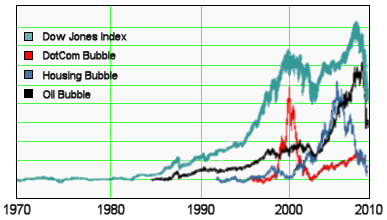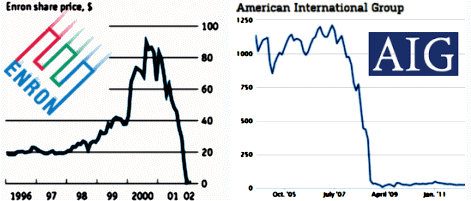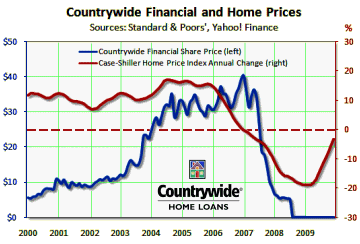In looking at the history of psychiatry, 1980 marks a radical change with the introduction of the DSM-III. But that was hardly the only thing happening in 1980, not by a long shot. Probably the most remarkable event was the election of Ronald Reagan which marked a dramatic change in our way of doing capitalism – the unregulated free-market way. 1980 is where a lot of graphs begin – like the rise of wealth inequity or our separating from the rest of the world with medical costs [in spite of no gain]. Reagan’s deregulation was sustained and defended by his Federal Reserve Chairman, Alan Greenspan, who artfully controlled our free economy by manipulating interest rates from 1987 until retiring in 2005, just as the housing market began its free-fall, ushering in the Great Recession in 2008:

 Probably the most perceptive observer of human behavior of the era was actually an economist at Yale, Robert Shiller, who found a way to quantitate the value of real estate, the Case Shiller Index. In 2000 he published a book, Irrational Exuberance, that predicted what would happen when the real estate "bubble" finally "burst." His title came from a speech by Alan Greenspan explaining away the earlier "DotCom bubble" as an anomoly. In Shiller’s Behavioral Economics, it was a an example of a natural exception to the Supply/Demand economic principle – a runaway financial market doomed to collapse – something like the Gold Rush. The Housing Market did indeed crash in spades, just as he predicted, bringing the economy down with it:
Probably the most perceptive observer of human behavior of the era was actually an economist at Yale, Robert Shiller, who found a way to quantitate the value of real estate, the Case Shiller Index. In 2000 he published a book, Irrational Exuberance, that predicted what would happen when the real estate "bubble" finally "burst." His title came from a speech by Alan Greenspan explaining away the earlier "DotCom bubble" as an anomoly. In Shiller’s Behavioral Economics, it was a an example of a natural exception to the Supply/Demand economic principle – a runaway financial market doomed to collapse – something like the Gold Rush. The Housing Market did indeed crash in spades, just as he predicted, bringing the economy down with it:


Pharmalot: WSJBy Ed SilvermanJune 16, 2015
For the past several years, the pharmaceutical industry has been relying on a model that sometimes resembles Hollywood studios. Rather than use their resources to build every medicine from scratch, the biggest drug makers increasingly look outside their own labs to buy a company or license a compound and then use their financial, regulatory and marketing muscle in hopes of creating a hit.
So how is that working out? A new analysis says not so well, at least for most companies. With few exceptions, most drug makers did not end up using their capital efficiently to make acquisitions between 2004 and 2014, according to the analysis by the McKinsey consulting firm. Similarly, few drug makers succeeded in forging licensing deals that generated blockbuster products. Put another way: most drug makers had low hit rates. “Overall, it seems few companies excel at sourcing innovation externally,” the consultants wrote in Nature Reviews Drug Discovery…To be sure, there were success stories. For example, there was the $11 billion that Gilead Sciences paid to acquire Pharmasset and its hepatitis C compounds. As for licensing, the consultants pointed to a pair of deals in which Johnson & Johnson licensed the Xarelto bloodthinner from Bayer and the Imbruvica cancer treatment from Pharmacyclics. But only two drug makers – Roche and J&J – ranked highly in both categories.
“It’s really hard to be successful at both M&A and licensing,” says Myoung Cha, a partner in the medical products practice at McKinsey. “There are few companies that seem to be consistently good. Overall, there’s a huge spread in performance in efficiency, at least among the largest companies… And licensing looks very similar to venture capital investment. One or two great deals can make all the difference.”
In fact, the analysis found that few drug makers were able to license one or more blockbuster medicines over that 10-year period, despite a large number of deals. And most of the blockbuster deals – seven out of 10 – involved late-stage licenses, which suggests that many of the higher-quality molecules were more expensive to source, according to the consultants.
So what does this mean for the notion that external sourcing will save the day and help the pharmaceutical industry reinvent itself? “Many companies are trying to make large pushes to external sourcing,” says Cha. “And many say it’s a great way to augment the pipeline. I would also say it’s not a panacea for building a strong pipeline. Companies really need to think hard about where to generate return for dollars invested – internal or external discovery. External sourcing is simply not a capability that every company has equally.”
But there’s a point here beyond my diatribe about corporate greed. PHARMA is a protected industry. The Approval process eg only two positive studies; the generous patent life; the patent extension options; allowing Direct-to-Consumer Advertising; the absence of strong price regulation; colluding with keeping their data hidden; all are among the many ways we reward the pharmaceutical industry for their research and development of new medical treatments. They get special concessions as payback for their R&D efforts.
Medicine is a business, as we would not see margins in any other business, as posted in this link:
http://wendellpotter.com/2015/06/for-profit-hospitals-mark-up-prices-by-more-yhan-1000-percent-because-theres-nothing-to-stop-them/
I will leave it to the psychiatrist to consider the ethics of this sales presentation and the resulting financial gain:
http://runningahospital.blogspot.com/2015/06/channeling-aristotle.html
I noticed this change as I went through my undergraduate and graduate programs in business during the 70’s. We moved from a very psychological based system of motivation and bringing the best out of people to a system based solely on numbers. Not making your numbers meant you were gone.
Today I am shocked to find that in many large companies people are continually on the disciplinary grid. There is no motivation on the part of supervisors, only the use of fear. This attitude has seeped into our daily lives as people have become rude and only interested in self in their personal interactions.
Watch some one drop litter on the street and ask them to pick it up and they will tell you to “prove it.” Try to engage a young person in a conversation and they are unable due to their world starting and ending at the finger tips and the device they own.
Much has changed since 1980 and much of it is not for the better.
When rereading this I sound old.
Steve Lucas
Economists are noted for playing with the data to get the desired result, in this case seven years of zero interest policy and twenty years of Fed induced bubbles that tend to benefit those who hold the riskiest high beta stocks, people like Jeff Bezos. However, this doesn’t do much for the middle class who are unemployed (but not counted because they gave up looking for work) and paying more for everything (because food, housing, fuel, tuition are not counted in the CPI and hedonic adjustments are made).
Anyone who believes unemployment is low and that inflation doesn’t exist is a fool or living in another kind of bubble.
The problem with unemployment numbers is they do not reflect the true economy. Work participation is near 1970’s levels. The problem is that we have a larger population and larger work force as women have entered in large numbers in the last 45 years.
Additionally those working part time are counted as employed. This impacts the recent college grad who is still working retail of fast food, living at home, and not paying off student loans, let alone starting a life.
We need a consistent three percent plus GDP growth in order to provide full employment and absorb new people entering the work force. This is not a number we have seen in several years.
Today I look at my age group and see those hanging on with part time work or relying on the income of one spouse until age 62. What this also leads to is a lower standard of living for those who are retiring and we are finding The Greatest Generation is not leaving large sums of money as they spend down their savings on medical cost.
We will continue to see income inequality until we see opportunities driven by full time employment and the ability for workers to move up and invest their disposable income.
Steve Lucas
I read that the front row seats for the Golden State games went for 50K….talk about misplaced priorities…but that’s a rounding error for some execs in Silicon Valley…
Fed policy of forcing people into high beta stocks (the valuation of Twitter is pure insanity) is creating all kinds of distortions…notice that these high net worth individuals love to talk about raising income taxes (which hurts the professional “petty bourgeoise” class) but not so much about a wealth tax which would adversely affect the three comma club (billionaires).
You are correct…U6 is the number we should be looking at.
We need to transition to a steady-state economy. The whole free market thing worked for about 45 minutes at the start of the Industrial Revolution, and has been a shell game ever since.
The token economy starts in grad school with grades and credits, and then the currency changes to clinical hours, which are really hard to earn for psych assistants and MFT interns. The big blitz is on and it’s just go, man, go from there on out.
I just applied for a really cool job doing case management and psychotherapy with a very happening company. Involves doing home visits all over the county, they probably want someone younger, but maybe not– I love crisis and field work, I don’t drink, and I’ve got a clean license and a fast car.
Lovely people, but it is, as y’all say, a numbers game. There seems to be some kind of quota or benchmark for client hours– there always is– and it sounds pretty aggressive.
And I am also very disappointed to see some younger people live in fear of the punishment room. Many in the ratbox can’t press the bar fast enough.
But not all of them. I love my younger colleagues. Many are strong and doing well, very well, in fact. Whether they will be strong enough to change BAU– Business As Usual– that remains to be seen.
We’ll see.
MIckey, as you hint in your opening salvo, regulation hasn’t made any progress since the ’80s; in fact, regulatory agencies have been remodeled into business facilitators.
Good primer on how and why CPI is manipulated:
http://www.shadowstats.com/article/no-438-public-comment-on-inflation-measurement
I think in many ways this is the same group psychodynamic as the promotion of bio bio bio. People who have a habit of lying continuously lying to people who want to be lied to. There is no way to break the cycle. If you do, you’re the sober guy at the fraternity party.
“Facts are the enemy of truth.”
In a society where even race seems to be an issue of choice, and belief is the ultimate determination of truth, sorting out what is fact has become not only harder, but places one at odds with society.
This is not to equate facts with a hard line stance, but we have lost all sensibility when even the very basics of a concept are shuttled aside for what is “right” or politically correct.
How can I be wrong when so many people believe me is a dangerous criteria in medicine, politics, and society in general.
Steve Lucas